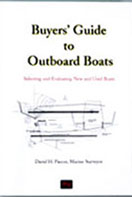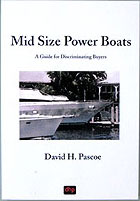Chapter 9
Excerpt
How Many Hours Will It Run?
This discussion concerns high horsepower outboards of 150 hp or greater. How many hours define the life of an outboard engine is probably one of the most common questions asked.
My view is that people tend to place too much emphasis on engine hours. After all, an hour meter is just a clock that starts running when the key switch is turned on. They do not measure the amount of time the engine was sitting on the back of a boat in a wet, corrosive environment, nor what happens to that engine.
Meters can also be misleading in that it doesn't have to be that the engine is running; the meter will run if the key is inadvertently left on, so hour meters should not automatically be considered as accurate.
Moreover, meters can be replaced. Both meters should read the same or within a few hours. At best, hour meters are an indicator of the amount of time an engine has been run, but it does not account for how it has been run or maintained.
Needless to say, the more a boat is used, the more hours one will get from it. A boat that is used very frequently could easily get two to three times the total number of operating hours over a boat that is seldom used.
With good care, more use, i.e. higher operating hours, does not necessarily translate into much higher wear, and therefore a shorter future life. When thinking about used engines, think in terms of engine hours and years.
This question would be better framed in terms of what is a reasonable life expectancy of an engine.
Obviously, that depends on a lot of factors, such as whether it's used in salt water or fresh, or whether the owner uses his engine(s) wisely, or whether he's the type who likes to run them wide open for long periods of time, or loves making jack-rabbit starts, and so on.
It also depends on where the boat has been kept or stored. Was it afloat, in covered dry storage, or on a trailer outdoors? Obviously, engines kept in a sheltered, drier environments are less likely to suffer from atmospheric corrosion damage.
Unfortunately, there's no way to answer many of these questions short of performing a thorough engine survey. Sometimes we can get a clue just from observing the general maintenance of the boat itself; if the owner doesn't keep up with general maintenance with the rest of the boat, he's not likely to keep up with the engines either.
Many outboard boats do not have hour meters, so I don't have a good feel for how many hours saltwater engines last.
However, I do get a good feel for how many years they continue in service, and this varies greatly by engine manufacturer. It is not uncommon to find Yamaha engines still going strong after ten years or more.
Only infrequently do I find other manufacturer products lasting this long. On average, my estimation is that outboard engine life (in saltwater, 12 month seasons) goes about eight years for engines that receive reasonably good care.
(Additional spaces are added for easy screen reading.)
Table of Contents: Chapter No
How
Many Hours Will It Run?
Checking Out Engines
Fuel Injection vs. Carburetor
Types of Fuel Injection
Feedback on Direct Fuel Injection Systems as of October,
2001
OMC
Mercury
Yamaha
Honda Four Cycles
Carbureted Engines
Compression Tests
Motor Mounts
Lower Unit
Check Lower Unit Oil
Controls
Performance Testing
Cavitation
Boat Performance
Engine Speed, Performance and Propellers
Used Motors Without a Boat
 Buyers' Guide to Outboard Boats
Buyers' Guide to Outboard Boats - Selecting and Evaluating New and Used Boats
by David H. Pascoe
Soft Cover
272 pages
Publisher: D. H. Pascoe & Co., Inc.
Published: 2002
Language: English
ISBN-10: 0965649628
ISBN-13: 9780965649629
In Stock
HOME >
David Pascoe - Biography
David Pascoe is a second generation marine surveyor in his family who began his surveying career at age 16 as an apprentice in 1965 as the era of wooden boats was drawing to a close.
Certified by the National Association of Marine Surveyors in 1972, he has conducted over 5,000 pre purchase surveys in addition to having conducted hundreds of boating accident investigations, including fires, sinkings, hull failures and machinery failure analysis.
Over forty years of knowledge and experience are brought to bear in following books. David Pascoe is the author of:
- "Mid Size Power Boats" (2003)
- "Buyers’ Guide to Outboard Boats" (2002)
- "Surveying Fiberglass Power Boats" (2001, 2nd Edition - 2005)
- "Marine Investigations" (2004).
In addition to readers in the United States, boaters and boat industry professionals worldwide from over 70 countries have purchased David Pascoe's books, since introduction of his first book in 2001.
In 2012, David Pascoe has retired from marine surveying business at age 65.
On November 23rd, 2018, David Pascoe has passed away at age 71.




Normally orders ship the same day, if placed before 12:00 PM Eastern time.